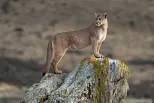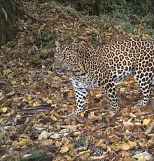Research

Patagonia Wild Cats Project
The Patagonia Wild Cats Project aims to address the threats faced by Argentina's wild felids, such as overgrazing and hunting, while adding to our basic knowledge of little known small cat species.

Diablo PumaLink Project
The PumaLink project aims to address the pressing issue of habitat fragmentation and lack of connectivity for mountain lions in the East Bay North Diablo Range of the San Francisco Bay Area in California. The current situation poses a significant risk of inbreeding and local extinctions among these iconic predators, further threatening the fragile biodiversity of the region. Without immediate action, the long-term viability of mountain lion populations and the delicate ecological balance of the East Bay Diablo Range are at stake.

A wild bobcat in Marin County. Photo courtesy of and copyright Trish Carney. All rights reserved. Used with permission.
Bay Area Bobcat Project
Fragmentation of habitat is a major threat to wildlife populations throughout the San Francisco Bay Area. With this project we will learn more about species movement in several locations in the Santa Cruz and Diablo Mountain ranges. This will enable us to make informed recommendations to land managers and roadway engineers concerning location of wildlife corridors to help protect local ecosystems.

Bhutan Wild Cat Health Project
The Bhutan Wild Cat Health Project is a groundbreaking initiative focused on protecting Bhutan’s nine native wild cat species, ranging from the iconic snow leopard and tiger to the elusive clouded leopard and other small felids. As tourism expands and free-ranging domestic dogs encroach on protected areas, threats to wildlife health and habitat connectivity are on the rise.

Grand Staircase-Escalante Cougar Project
Understanding population dynamics of mountain lions in the Grand Staircase-Escalante National Monument (GSENM)

Cheetahs in Tsavo East. Photo courtesy of and copyright ©IngridVekemans. All Rights Reserved.
Tsavo Cheetah Project
Kenya has been identified as one of the last remaining strongholds for the cheetah, making it an essential refuge for the future of the species. Researcher Cherie Schroff and her team are evaluating the population and conservation status of cheetahs in the greater Tsavo ecosystem and implementing long-term conservation solutions, in order to ensure their long-term survival.

A mountain lion (puma concolor) spotted near the north end of Vancouver Island, BC, Canada. Photo courtesy of and copyright Jarrett Lindal of Jarrett Lindal Media. All rights reserved.
Bay Area Puma Project
The Bay Area Puma Project (BAPP) is the first large scale research, education and conservation program for pumas in and around the San Francisco Bay Area. BAPP's primary goal is to increase knowledge, understanding and awareness about Bay Area puma populations, in order to help foster a more harmonious relationship between humans and the natural world.
Do You Have 2-4 Hours A Month To Preserve Your Local Ecosystem?
Our volunteers are the driving force behind making true change in ecosystem health and wild cat conservation. Some like to volunteer in the field, others help us maintain our online presence, and some work with events. With just a few hours a month, you can make a difference, too.
Make A Difference Right Now
As a 501(c)3 nonprofit, our work is only possible because of generous donors like you.
More than 90% of your donation will go directly to our groundbreaking research, outreach, and education programs.
This is where true change starts. If you’d like to be a part of it, make a donation to Felidae Conservation Fund today:
Or,
